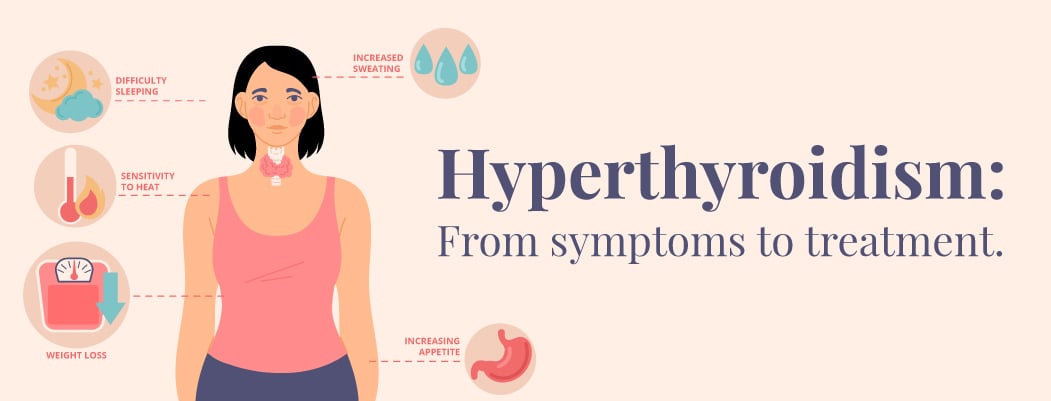Is hyperthyroidism curable?
December 15, 2022

When you have hyperthyroidism, your thyroid produces and releases more hormones than you require. Another name for this is hyperactive thyroid. Triiodothyronine (T3) and thyroxine are the primary hormones your thyroid produces (T4). A doctor must treat hyperthyroidism because it can impact the entire body.
Contents
- How does my thyroid work?
- What distinguishes hypothyroidism from hyperthyroidism?
- Who is prone to hyperthyroidism?
- Which signs and symptoms indicate hyperthyroidism?
- Why causes hyperthyroidism?
- Overtreatment with thyroid hormone
- How is hyperthyroidism diagnosed?
- Physical examination to identify hyperthyroidism
- How to cure a hyperthyroidism condition?
- Incorporating dairy-free or non-dairy options
- Who to consult for hyperthyroidism?
- People also ask
How does my thyroid work?
The thyroid is a butterfly-shaped gland at the front of your neck. You have glands, which are organs, all over your body. Hormones, which support your body’s growth and function, are produced and released by a few of your glands. The thyroid gland is vital for many of your body’s essential processes, such as:
- Controlling the temperature of your body.
- Regulating the rate of your heart.
- The management of metabolism.
Your body is in equilibrium, and all your systems perform properly when your thyroid gland functions appropriately. However, your entire body may be affected if your thyroid ceases to produce thyroid hormones as it should, either in excess or insufficiently.
What distinguishes hypothyroidism from hyperthyroidism?
The difference between hyperthyroidism and hypothyroidism is how much thyroid hormone your thyroid produces and releases. Both disorders are medical conditions.
Just think of anything hyper-related. Most likely, all you did was think of anything fast or energetic. Your thyroid is overactive and creates and releases an excessive amount of thyroid hormone when you have hyperthyroidism.
The prefix “hypo-“ denotes “low” or “not enough” in the medical field. For example, your thyroid is underactive when you have hypothyroidism, and it doesn’t produce and release as much thyroid hormone as your body requires.
Who is prone to hyperthyroidism?
Hyperthyroidism can affect anyone, but women are more likely to get it.
Which signs and symptoms indicate hyperthyroidism?
The various symptoms of hyperthyroidism can affect every part of your body. Some of these symptoms might be present for you at once, while others might not. Hyperthyroidism symptoms can include:
- Rapid heartbeat (palpitations).
- Trembling and/or being anxious
- Loss of weight.
- Increased appetite
- Increased frequency of bowel motions and diarrhoea.
- Vision changes.
- Warm, thin, and moist skin
- Menstrual changes.
- Excessive perspiration and heat intolerance.
- Sleep issues.
- Neck expansion and swelling brought on by an enlarged thyroid gland (goiter).
- Hair texture changes and hair loss (brittle).
- Eyeballs that bulge (as with Graves’ illness).
- Weakened muscles
Why causes hyperthyroidism?
Several factors can lead to hyperthyroidism, including
- Graves’ disease
- Overactive thyroid nodules
- Inflammation of the thyroid gland called thyroiditis
- Too much iodine NIH external link
- Too much thyroid hormone medicine
- A noncancerous tumour of the pituitary gland
Graves’ illness
Graves’ disease is the most frequent autoimmune illness that results in hyperthyroidism. Your thyroid is attacked by this illness, which causes it to produce an excessive amount of thyroid hormone.
Thyroiditis
Your thyroid gland is inflamed when you have thyroiditis. In addition, thyroid hormone may leak into your bloodstream due to several types of thyroiditis. You might therefore get hyperthyroidism symptoms.
Various thyroiditis kinds might result in hyperthyroidism.
- A painfully inflamed and swollen thyroid is a symptom of subacute thyroiditis.
- A woman may experience postpartum thyroiditis after giving birth.
- Similar to postpartum thyroiditis, but without pregnancy, it is painless thyroiditis. You might have an enlarged thyroid. According to experts, painless thyroiditis is most likely an autoimmune disorder.
- Hypothyroidism, or an underactive thyroid, can also result from thyroiditis. Your thyroid may occasionally go from overactive to underactive after being overactive for a while.
Too much iodine
Your thyroid uses iodine to produce thyroid hormone. The amount of thyroid hormone your thyroid produces is influenced by how much iodine you consume. Iodine overdose may result in the thyroid producing excessive levels of thyroid hormone in some individuals.
There may be a lot of iodine in several cough syrups and medications, including some cardiac medications. In addition, iodine is present in large quantities in seaweed and supplements made from seaweed.
Overtreatment with thyroid hormone
Some individuals on thyroid hormone therapy for hypothyroidism may overdo it. If you use thyroid hormone medication, have your thyroid hormone levels evaluated by your doctor at least once a year. If your doctor determines that your thyroid hormone level is too high, you might need to modify your dose.
Thyroid hormone medications may potentially interact with other medications and cause hormone levels to rise. When taking new medications, consult your doctor about potential interactions if you use thyroid hormone medication.
Noncancerous tumour
A noncancerous growth of the pituitary gland, found near the base of the brain, can occasionally lead to hyperthyroidism.
How is hyperthyroidism diagnosed?
There are various methods your doctor might use to identify hyperthyroidism, including
- A physical examination of your neck to check for an enlarged thyroid.
- Blood tests to check for elevated thyroid hormone levels.
- Imaging examinations to examine your thyroid
Physical examination to identify hyperthyroidism
During a physical examination in their clinic, your doctor may check the following if you exhibit signs of hyperthyroidism:
- A thyroid: If your thyroid is swollen, lumpy, or painful, your doctor may use the outside of your neck to feel it gently.
- Your eyes: Your physician might examine your eyes for oedema, redness, bulging, and other Graves’ eye disease symptoms.
- Your heart: Using a stethoscope, your healthcare professional may check for a rapid or irregular beating.
- Your hands: Your healthcare professional could ask you to extend your hands to check for tremors. They might also check your fingernails for changes.
- Your skin: Your healthcare professional may touch your skin to check for warmth and moisture.
How do you cure a hyperthyroidism condition ?
A particular diet cannot cure a thyroid condition.
However, minimizing excessive iodine intake and avoiding iodine supplements can assist in lessening thyroid activity abnormalities.
A healthy thyroid can be maintained with a balanced diet. If a person decides to take supplements, they should consult a physician for guidance on dosage and which supplements won’t interfere with thyroid function. One can experiment with the following dietary changes:
Incorporating dairy-free or non-dairy options
- Eating at least five servings of fruits and vegetables each day.
- Drinking lots of fluids, such as water.
- Choosing high-fibre foods, such as whole grains, potatoes, rice, and pasta; cooking with unsaturated fats.
- Choosing lean proteins, such as those from chicken, beans, other legumes, and fish, among other sources.
Additionally, avoiding iodine-rich foods and items like seaweed, some cough treatments, and multivitamins may be helpful to some people. People can also talk to their doctor about other options that suit them.
Who to consult for hyperthyroidism?
Most likely, you’ll begin by visiting your primary care physician. However, an endocrinologist, an expert in hormone issues, may be recommended to you directly.
People also ask
1. Can hyperthyroidism go away?
It’s possible to treat hyperthyroidism. Without treatment, certain causes can disappear. Graves disease-related hyperthyroidism typically gets worse over time. It has numerous problems, some of which are serious and have an impact on the quality of life.
2. Is hyperthyroidism a lifelong disease?
The condition of hyperthyroidism is chronic or lifelong for many people. You must retest your thyroid levels after treatment to ensure you’re taking the right medicine dosage.
3. How long is hyperthyroidism recovery?
Depending on what triggered the hyperthyroidism, the length of time it takes to treat it may vary. If your doctor uses antithyroid medications to treat your condition, your hormone levels should fall to a healthy level in six to twelve weeks.








